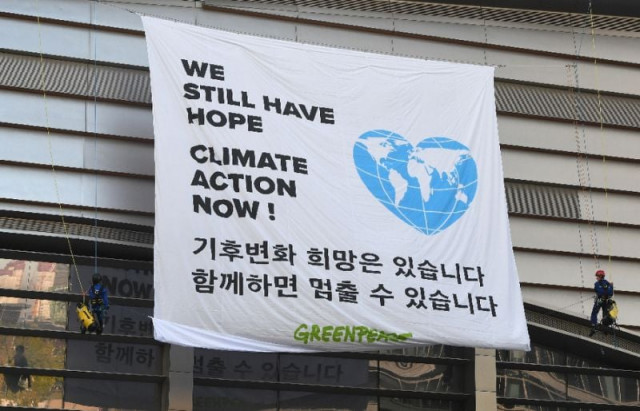Planned fossil fuel output swamps Paris climate goals
Paris Agreement calls for blocking global warming at well below 2C, and 1.5C if possible

The UN's climate chief is pressing for a detailed action plan to move the Paris climate accord forward. PHOTO AFP
The world is on track to produce 50 per cent more fossil fuels than could be burned without increasing Earth's surface by more than two degrees Celsius above preindustrial levels, they said in a major report.
If temperature rise is to be limited to 1.5C, planned fossil fuel production is more than double what can be tolerated.
Australian man accused of starting bushfire to protect cannabis crop
The 2015 Paris Agreement calls for blocking global warming at well below 2C, and 1.5C if possible.
With only 1C of warming to date, the world has seen a crescendo of deadly heatwaves, flooding, and superstorms made more destructive by accelerating sea level rise.
"Over-investment" in coal, oil and gas supply locks in infrastructure that clashes head-on with the need to slash greenhouse gas emissions in the coming decades, the researchers cautioned.
A major UN report last year concluded that global CO2 emissions must drop 45 per cent by 2030 -- and reach "net zero" by 2050 -- to cap temperature rise at 1.5C.
"We show for the first time just how big the disconnect is between Paris temperature goals and countries' plans and policies for coal, oil and gas production," said lead author Michael Lazarus, director of the Stockholm Environment Institute's US Center.
This "production gap" -- between output in the pipeline and the Paris climate goals -- is largest for coal, according the report, a joint project by the UN Environment Programme and four climate change research centres.
Countries plan to produce 150 per cent more coal by 2030 than would be consistent with a 2C world, and 280 per cent more than would be consistent with limiting warming to 1.5C.
China is the world's largest coal producer, accounting for more than 40 per cent of global output in 2017. Domestic production doubled from 2000 to 2013, dropping briefly before resuming an upward trend.
For oil and gas, nations are on track to produce a 40 to 50 per cent surplus in 2040.
The United States generated more of both fossil fuels than any other nation last year, and is the world's number two producer of coal.
The Trump administration, which notified the UN earlier this month that the US will pull out of the Paris treaty, has taken steps to boost fossil fuel production, including subsidies for technology to capture CO2 emissions from power plants.
Many oil and gas projects approved by major fossil fuel companies in 2018 and the first 10 months of this year appear to assume that global temperatures will rise well beyond the 2C threshold, according to research published last month.
Eighteen major investments over this period, totalling $50 billion, would only become profitable if the world exceeded the Paris targets.
The new report points to several ways the fossil fuel "production gap" could be narrowed, but change has proven difficult to achieve.
One is reducing subsidies. Direct handouts to oil, gas and coal production worldwide run into the tens of billions of dollars each year.
Oil majors could also limit exploration and extraction, and shift towards other forms of energy, the report suggested, though few corporations have taken decisive steps in that direction.
Iceland students see chilling reality of melting glacier
The report comes as political and social pressure to act on climate change is mounting.
More than 60 countries have committed to updating voluntary commitments to cut greenhouse gas emissions taken under the Paris Agreement, and to layout revised plans by the end of next year.
"Governments' continued support for coal, oil and gas extraction is a big part of the problem," said Mans Nilsson, one of 50 co-authors and executive director of the Stockholm Environment Institute. "We're in a deep hole, and we need to stop digging."



















COMMENTS
Comments are moderated and generally will be posted if they are on-topic and not abusive.
For more information, please see our Comments FAQ